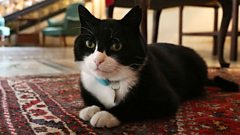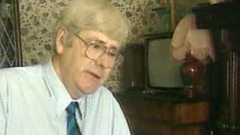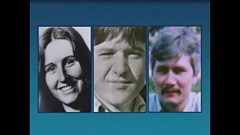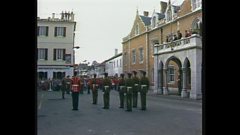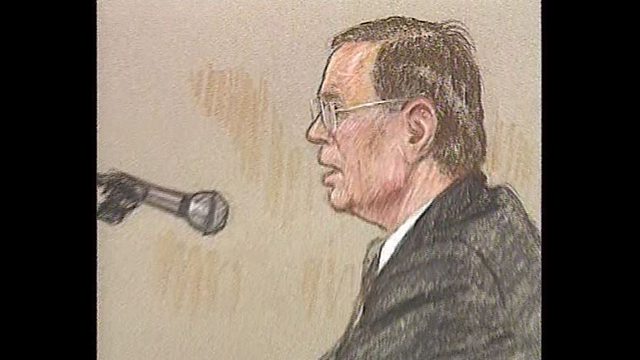
Roger Maitland attends Sir John May’s inquiry
Roger Maitland, a former Legal Assistant in the office of the Attorney General, gives evidence to Sir John May’s inquiry into the cases of the Guildford Four and the Maguire Seven.
Neil Bennett, the ����ý’s Home Affairs Correspondent, reports on Roger Maitland’s evidence to Sir John May’s inquiry into the cases of the Guildford Four and the Maguire Seven (please see context below).
On 20 October 1989, following the quashing of the Guildford Four convictions, May was appointed to chair an inquiry into that case and the related case of the Maguire Seven.
Neil Bennett’s report begins with footage of Roger Maitland walking into the May inquiry.
Neil Bennett states: “Roger Maitland seems to have been a lone voice in the wilderness in the 1970s in questioning the scientific tests which underpinned many terrorist prosecutions of the time”.
Mr. Maitland was a legal assistant in the office of the Attorney General, Mr. Sam Silkin, who had to approve the prosecutions of the Maguire Seven.
Mr. Maitland was doubtful that the TLC test, which was supposed to detect the presence of nitro-glycerine, was being carried out accurately.
Neil Bennett continues: “He told the inquiry he thought the scientists were being secretive, he’d found it difficult to get them to explain their methods and findings.”
Mr. Maitland was also concerned about contamination of samples and the muddling of labels.
Over footage of Anne Maguire and her son Patrick walking out of the inquiry Bennett informs us: “Anne Maguire and her family were only prosecuted after the Attorney General was assured that Mr. Maitland’s fears were groundless and that the tests were virtually infallible.”
Bennett concludes to camera: “Mr. Maitland’s evidence to the inquiry is that he would not have agreed with this and he feels sure he would have said so at the time. It took the legal system another 16 years to discover how right he was to voice his concerns.”
CONTEXT
On 5 October 1974 the Provisional Irish Republican Army (PIRA) targeted Guildford, Surrey, because it was situated close to a number of garrison towns. The PIRA planted two six-pound gelignite bombs in two pubs. The first exploded just before 9.00pm in the Horse and Groom, destroying the front of the building and shattering the windows of neighbouring shops.
It killed Paul Craig, a plasterer (22 years old); two members of the Scots Guards, William Forsyth (18) and John Hunter (17); and two members of the Women’s Royal Army Corps, Caroline Jean Slater (18) and Ann Ray Hamilton (19). A further sixty-five persons were wounded.
After the first explosion, other public houses were evacuated, including the Seven Stars where the second bomb exploded at approximately 9.35 pm without causing any serious injuries.
On November 7 1974 Gunner Richard Dunne, a soldier (42) and Alan Horsley, a sales clerk (20) were killed when a PIRA bomb exploded in the King’s Arms in Woolwich. Twenty-six people, including five soldiers, were injured.
In December 1974 the police arrested three men and a woman: Gerry Conlon, Paul Hill, Patrick Armstrong and Carole Richardson. In October 1975 these four were convicted of the Guildford and Woolwich bombings and given life sentences. The group was known as the Guildford Four.
On 4 March 1976 the Maguire Seven were convicted of making the explosives used in these bombings. The Maguire Seven were: - Anne Maguire, Patrick Maguire (Anne’s husband), Patrick Maguire (son of Anne and Patrick), Vincent Maguire (son of Anne and Patrick), Sean Smyth (brother of Anne), Patrick O’Neill (family friend) and Giuseppe Conlon (brother-in-law of Anne Maguire and father of Gerry Conlon).
Over the years, the cases of the Guildford Four and the Maguire Seven came under increasing legal scrutiny and the range of those seeking a review of the convictions extended widely. On 17 October 1989 it was announced that corruption proceedings would be taken against the police involved in the conviction of the Guildford Four. Two days later, with the exception of Paul Hill, those convicted for the bombings were released. This followed an announcement by the Director of Public Prosecutions that it would be wrong for the Crown ‘to seek to sustain’ the convictions of 1975 on the basis of confessions that were later retracted.
The Court of Appeal had decided that the DPP in 1975 had suppressed scientific evidence which conflicted with the confessions. Paul Hill remained in custody because he was implicated in a case that had not yet been resolved. His conviction was eventually quashed in April 1994.
On 26 June 1991 the Court of Appeal overturned the sentences on the Maguire Seven – all of whom had completed their sentences.
Afterwards many criticised the court for dismissing most of the grounds of appeal and for simply concluding that the hands of the convicted could have been innocently contaminated with nitro-glycerine.
Duration:
This clip is from
More clips from ����ý Six O'Clock News
-
![]()
'He is not a European spy'
Duration: 01:42
-
![]()
Devastation in Omagh—17/08/1998
Duration: 01:53
-
![]()
Gibraltar victims named—07/03/1988
Duration: 01:16
-
![]()
Gibraltar's Changing of the Guard targeted—07/03/1988
Duration: 01:30

